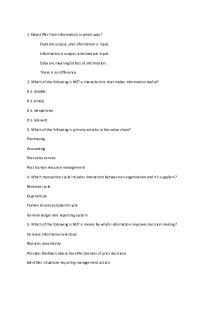1. How do managers differ from nonmanagerial employees? PDF

| Title | 1. How do managers differ from nonmanagerial employees? |
|---|---|
| Author | 2801 Dewan Foysal Haque |
| Course | Principles of Management |
| Institution | University of Dhaka |
| Pages | 2 |
| File Size | 67.7 KB |
| File Type | |
| Total Downloads | 11 |
| Total Views | 145 |
Summary
In today’s work environment the organization can runs with the coordination of both managerial and non-managerial position. Leadership, planning, policy making, supervision etc. comes under managerial position which indicates that all management functions are done by managerial employees .But Non -m...
Description
1. How do managers differ from nonmanagerial employees? Answer: In today’s work environment the organization can runs with the coordination of both managerial and non-managerial position. Leadership, planning, policy making, supervision etc. comes under managerial position which indicates that all management functions are done by managerial employees .But Non -managerial are responsible to carrying out functions for the organization. It means Managerial position have border responsibility, so they are in- charge steering the overall running of the business activities. And non- managerial position responsible for executing functions or jobs as guided by managerial positions. Hence they have a more limited range of responsibilities towards organisation. Managerial positions have a wide range of decision-making powers, which is based on their hierarchical level and non-managerial position are guided by their senior so they have no decision making powers. 2. Is your course instructor a manager? Discuss in terms of managerial functions, managerial roles, and skills. Ans: Instructors need to be good leaders just like managers. They need to have certain attributes similar to managers in order to complete specific tasks. These attributes include; being able to plan, organize, lead and control students. They should plan and organize students, student's assignments on time, and the topics and lessons they are going to teach them. They should also be able to organize students in groups so that they can encourage team work. Moreover, they need to be able to lead students by guiding them both in classwork, assignments and other issues and control students to ensure that they are not getting out of line.
Furthermore, instructors need to have specific skills such as proper communication with their students, critical decision-making attributes, and problem-solving skills. They also have to be good time managers by coming to class on time, and giving out and collecting assignments on time. These attributes are similar to those of a manager in one way or another. This is because, instructors have the role motivating students, evaluating their performances, guiding and instructing them and avoiding crisis situations and solving problems whenever they arise. These skills are critical in helping the instructor create a good relationship with students just as they help managers create good relationships with employees. Moreover, these skills show that the instructor is concerned with their student's welfare outside of class. Therefore, my course instructor is a manager....
Similar Free PDFs

What Great Managers Do
- 12 Pages

1. Data differ
- 3 Pages
Popular Institutions
- Tinajero National High School - Annex
- Politeknik Caltex Riau
- Yokohama City University
- SGT University
- University of Al-Qadisiyah
- Divine Word College of Vigan
- Techniek College Rotterdam
- Universidade de Santiago
- Universiti Teknologi MARA Cawangan Johor Kampus Pasir Gudang
- Poltekkes Kemenkes Yogyakarta
- Baguio City National High School
- Colegio san marcos
- preparatoria uno
- Centro de Bachillerato Tecnológico Industrial y de Servicios No. 107
- Dalian Maritime University
- Quang Trung Secondary School
- Colegio Tecnológico en Informática
- Corporación Regional de Educación Superior
- Grupo CEDVA
- Dar Al Uloom University
- Centro de Estudios Preuniversitarios de la Universidad Nacional de Ingeniería
- 上智大学
- Aakash International School, Nuna Majara
- San Felipe Neri Catholic School
- Kang Chiao International School - New Taipei City
- Misamis Occidental National High School
- Institución Educativa Escuela Normal Juan Ladrilleros
- Kolehiyo ng Pantukan
- Batanes State College
- Instituto Continental
- Sekolah Menengah Kejuruan Kesehatan Kaltara (Tarakan)
- Colegio de La Inmaculada Concepcion - Cebu













